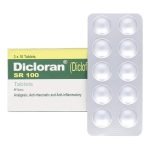delivery within 72 Hours
Diclorep Tablet 50mg
₨ 400
Product Title: DICLOREP TABLET 50MG
Generic: Diclofenac Sodium
Pack Size: 20s
Product Form: TABLETS
Delivery within: 2 to 3 working days across Pakistan
Shipping & Delivery
-
Courier delivery
Our courier will deliver to the specified address
2-3 Days
From Rs 250
-
Free 15-Day returns

Black Friday Blowout!
Description
Diclorep Tablet 50mg contains Diclofenac Potassium as its active ingredient. Diclofenac Sodium is a nonsteroidal anti-inflammatory drug (NSAID) that possesses analgesic (pain-relieving), anti-inflammatory, and antipyretic (fever-reducing) properties. It works by inhibiting the production of prostaglandins, which are substances in the body that contribute to pain and inflammation.
Ingredients:
- Diclofenac Potassium (50mg): Diclofenac Potassium is a salt form of Diclofenac and is commonly used in pharmaceutical formulations due to its rapid onset of action.
Uses:
Diclorep Tablet 50mg is indicated for the treatment of various conditions, including:
- Pain Relief: Diclofenac Potassium is effective in relieving pain associated with conditions such as arthritis, musculoskeletal disorders, dental pain, menstrual cramps, and postoperative pain.
- Inflammation Reduction: Diclofenac Potassium helps reduce inflammation associated with rheumatoid arthritis, osteoarthritis, ankylosing spondylitis, and other inflammatory conditions.
- Fever Reduction: Diclofenac Potassium may be used to reduce fever in certain circumstances, although it is primarily prescribed for its analgesic and anti-inflammatory effects.
Side Effects:
Common side effects of Diclorep Tablet 50mg may include:
- Gastrointestinal Upset: Nausea, indigestion, heartburn, and abdominal pain.
- Dizziness: Some individuals may experience dizziness or lightheadedness.
- Skin Reactions: Rarely, Diclofenac Potassium may cause skin reactions such as rash, itching, or hives.
- Gastrointestinal Ulcers and Bleeding: Long-term use or high doses of Diclofenac Potassium may increase the risk of gastrointestinal ulcers and bleeding.
Precautions:
- Cardiovascular Risk: Diclofenac Potassium may increase the risk of cardiovascular events such as heart attack or stroke, particularly with long-term use or in patients with pre-existing cardiovascular conditions.
- Renal Impairment: Diclofenac Potassium should be used with caution in patients with renal impairment, as it can impair kidney function and lead to fluid retention and edema.
- Hepatic Impairment: Patients with liver disease or hepatic impairment should use Diclofenac Potassium with caution, as it can cause liver toxicity and worsen existing liver conditions.
- Asthma: Diclofenac Potassium may exacerbate asthma symptoms in susceptible individuals. Patients with asthma should use Diclofenac Potassium cautiously and under medical supervision.
When Not to Use:
Diclorep Tablet 50mg should not be used in the following situations:
- Known hypersensitivity or allergy to Diclofenac Potassium or any component of the tablet.
- History of asthma, urticaria, or allergic-type reactions after taking aspirin or other NSAIDs.
- Active gastrointestinal ulcers or bleeding.
- Severe heart failure, renal failure, or hepatic failure.
- Pregnancy, particularly during the third trimester, due to the potential for fetal harm.
FAQ:
- How should Diclorep Tablet 50mg be taken?
- Can Diclorep Tablet 50mg be used for long-term treatment?
- Is Diclorep Tablet 50mg safe for elderly patients?
- How quickly does Diclorep Tablet 50mg work?
- Can Diclorep Tablet 50mg be used during breastfeeding?
Customer Reviews
You must be logged in to post a review.










Reviews
Clear filtersThere are no reviews yet.